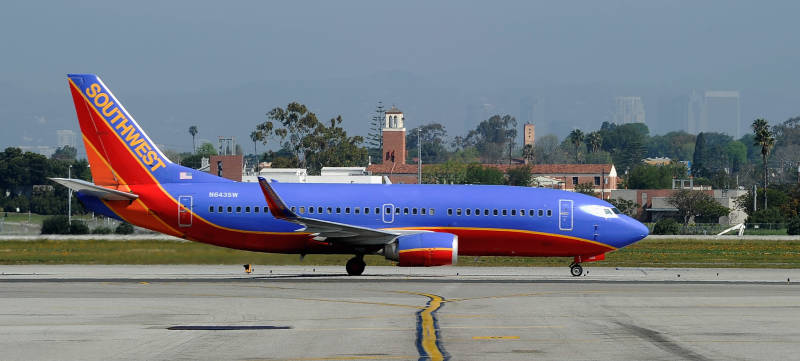After the passenger alerted crewmembers, the airline said, "an Arabic-speaking Southwest manager at LAX participated in the decision to request the passenger leave the aircraft and continue the conversation in the gate area. ... Federal law enforcement agents became involved and conducted their own investigation."
Makhzoomi, whose family fled Iraq in 2002 and came to the United States in 2010, told UC Berkeley's Daily Californian last week that the April 6 incident unfolded the day after he had attended a World Affairs Council event featuring U.N. Secretary-General Ban Ki-moon.
The Daily Cal, which noted Makhzoomi described himself as a loyal Southwest premier rewards member, boarded his flight to Oakland and called his uncle in Baghdad to tell him about the World Affairs Council event. Makhzoomi told The New York Times that during the call, he mentioned asking the U.N. chief a question about the Islamic State. When he signed off with his uncle, Makhzoomi said in both accounts, he said, "Inshallah" -- Arabic for "God willing."
Here's what Makhzoomi told the Daily Cal happened next:
When Makhzoomi hung up, he noticed a female passenger looking at him. Once he made eye contact with her, she got up and left her seat.
“She kept staring at me and I didn’t know what was wrong,” he said. “Then I realized what was happening and I just was thinking ‘I hope she’s not reporting me.’”
Minutes later, an airport employee arrived to remove Makhzoomi from the airplane. Makhzoomi was escorted onto the passenger boarding bridge where he was met by three security officers.
He learned that the passenger thought she had heard the word “shahid,” meaning martyr, which is associated with jihad and has been associated with terrorists.
The conversation between Makhzoomi and the employee became complicated and political. The employee informed Makhzoomi that he was not allowed to return to the plane.
Then Makhzoomi heard one of the security officers radio for the FBI.
“At that moment I couldn’t feel anything,” he said. “I was so afraid. I was so scared.”
Makhzoomi was removed from the jet bridge and taken back to the gate where more security officers, police dogs and Southwest staff awaited him. Dozens of onlookers watched as he waited for the FBI to arrive.
In the meantime, security officers searched his bag again and continued to ask him if he had any other luggage he was keeping secret. Makhzoomi alleged that one police officer publicly searched his genital area and asked him if he was hiding a knife anywhere.
“That is when I couldn’t handle it and my eyes began to water,” he said. “The way they searched me and the dogs, the officers, people were watching me and the humiliation made me so afraid because it brought all of these memories back to me. I escaped Iraq because of the war, because of Saddam and what he did to my father. When I got home, I just slept for a few days.”
In offering Southwest's account of the incident, airline spokewoman Brandy King noted the media accounts in which Makhzoomi "confirms he openly discussed a terrorist organization on the phone, minutes before his flight was scheduled to depart."
Original post, via The Associated Press
A UC Berkeley student who came to the United States as an Iraqi refugee says he was unfairly removed from a flight at Los Angeles International Airport earlier this month because a fellow passenger was alarmed by an innocent conversation he was having in Arabic.
Southwest Airlines said in a statement Sunday that the passenger, Khairuldeen Makhzoomi, was taken off the April 9 flight from Los Angeles to Oakland for questioning and the plane took off while that was happening. But the airline said it has not received a direct complaint from Makhzoomi and that he has not responded to several attempts to reach him.
Makhzoomi, a 26-year-old senior at Berkeley, said that he was calling his uncle before the flight to tell him about a speech he had attended by United Nations Secretary General Ban Ki-moon.
"I was very excited about the event, so I called my uncle to tell him about it," Makhzoomi told the New York Times.
Makhzoomi told his uncle about asking a question on the Islamic State group at the event. He said he used the phrase "inshallah," meaning "God willing," at the end of the conversation, and those things might have led to suspicion.
He said the woman sitting in front of him on the plane began staring at him. "That is when I thought, 'Oh, I hope she is not reporting me,' " Makhzoomi said.
Makhzoomi said an Arabic-speaking Southwest employee came and escorted him off the plane and asked him why he had been speaking Arabic.
Makhzoomi said he told the employee, "This is what Islamophobia got this country into." Makhzoomi said that made the man angry and that was when he was told he could not get back on the plane.
The FBI in Los Angeles said in a statement that it investigated the situation and found no further action was necessary.
Southwest said it could not offer specific comments before talking to Makhzoomi. The airline's statement said it regrets any less-than-positive experience by a customer, but its primary focus is on safety and its crew members followed protocol. It added that the company "neither condones nor tolerates discrimination of any kind."
Makhzoomi said he was able to get book a flight on another airline and got home eight hours later than planned.
"My family and I have been through a lot, and this is just another one of the experiences I have had," he told the Times. "Human dignity is the most valuable thing in the world, not money. If they apologized, maybe it would teach them to treat people equally."
